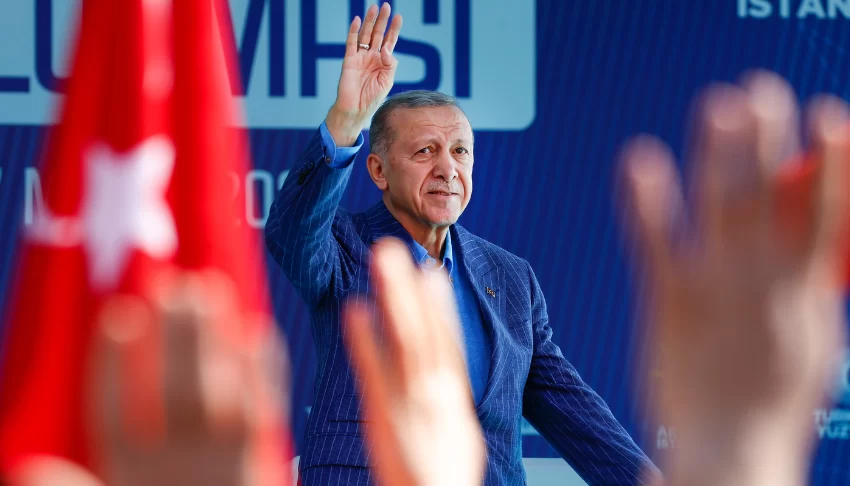
Turkey held its most consequential election in decades on May 14, 2023. The general elections saw over 64 million eligible voters cast their ballots to elect a president and parliament for a five-year term. President Recep Tayyip Erdoğan and his Justice and Development Party (AKP) were hoping to remain at the head of the table in what was a highly contested election. However, no candidate won 50% in the first round of voting, leading to a runoff between Erdoğan and his opposition rival Kemal Kilicdaroglu on May 28, 2023.
Despite facing his biggest political challenge in two decades with initial polls predicting a slim lead for the opposition, Erdogan ultimately emerged victorious and will serve another five-year term as president. The election results are significant for Turkey’s political landscape, as they determine the direction of the country’s policies for the next years.
Turkey’s political landscape is dominated by several major political parties, each with its own ideologies. The AKP, led by Erdoğan, is a conservative party that emphasizes Islamic values and economic growth. The main opposition party is the Republican People’s Party (CHP), which is a centre-left party that emphasizes secularism and democracy. Other notable parties include the Nationalist Movement Party (MHP), which is a right-wing party that emphasizes Turkish nationalism, and the pro-Kurdish Peoples’ Democratic Party (HDP), which emphasizes minority rights and democracy.
Several key political developments have contributed to a highly polarised political climate in Turkey. The government has faced criticism for its handling of the economy, which has been struggling with high inflation and unemployment rates and a weakening currency. The role of the media and public opinion were also crucial in the lead-up to the 2023 elections, with President Erdogan’s government being accused of exerting strong control over the media and targeting perceived critics and political opponents. The opposition has promised to address these issues and promote greater freedoms and civil liberties.
Additionally, Turkey has been involved in several international conflicts, including the ongoing war in Syria and tensions with Greece over territorial disputes in the Aegean Sea, which puts human rights, the rule of law, and the country’s relationship with the European Union high on political agendas.
The major issues and campaign platforms in the 2023 elections included concerns about the erosion of democratic institutions, economic instability, and rising nationalism. The candidates have made various campaign promises, including pledges to address corruption, improve public services, and strengthen democratic institutions.
Specifically, President Recep Tayyip Erdogan’s campaign platform was focused on his record of economic growth and stability, his commitment to national security, and on preserving Turkey’s traditional values. His main challenger, Kemal Kilicdaroglu, campaigned on a platform of restoring democratic institutions, human rights, and social justice. Kemal has promised to restore Turkish democracy and normalize Turkey’s international role, leading to a shift in Turkey’s relations with the EU and NATO, and to conduct economic reforms and the reversal of Erdogan’s policies, leading to a more democratic and prosperous Turkey.
Potential alliances and coalitions were also significant factors in the 2023 elections. The AKP and MHP have formed the People’s Alliance, while the CHP, IYI, and other smaller parties have joined forces in the Nation Alliance.
The results of the 2023 Turkish elections will have significant implications for domestic policy, particularly in terms of the balance of power and governance. President Recep Tayyip Erdogan has been in power for the past 20 years, and his party, the AKP, has held a majority in parliament for much of that time. The results determine a continuity regarding economic policies, foreign relations, and social policies, which have often been controversial and have strained Turkey’s relationships with other countries.
With the victory of Erdogan, there could be further authoritarianism and political polarization. There could also be further restrictions on civil liberties and human rights, which, along with the continued economic challenges, could lead to more protests and civil unrest, as many people are already dissatisfied with his rule.
Additionally, the new measures implemented by the Supreme Election Council (YSK), which include the selection of judges by lottery rather than seniority, have a significant impact on election results, the judicial system and the rule of law in Turkey.
While the electoral concerns seem to be primarily domestic, the elections will also have foreign policy dimensions and international implications. The election was closely watched by the international community, with many interested in how the results would impact Turkey’s political landscape, its relationships with other countries and its political and economic influence in the region and beyond. With Erdogan’s victory, the future of Turkish democracy and its relations with Greece, Cyprus, the East Mediterranean and the EU will probably not take very different paths in the years ahead, with the President prioritizing a new wave of normalization in Turkey’s Middle East foreign policy, the and re-establishing normal diplomatic relations with countries, which represents an attempt to turn over a fresh leaf in bilateral relations with multiple states.
References
Turkey’s Elections Won’t Be Free or Fair. (n.d.) Retrieved May 29, 2023, from foreignpolicy.com
Turkey election results 2023 by the numbers. (n.d.) Retrieved May 29, 2023, from www.aljazeera.com
How to watch the Turkish elections like a pro. (n.d.) Retrieved May 29, 2023, from www.politico.eu
Turkey election run-off results 2023 by the numbers. (n.d.) Retrieved May 29, 2023, from www.aljazeera.com
Political Coalitions in Turkey in the Run-Up to the 2023 …. (n.d.) Retrieved May 29, 2023, from www.ifri.org
Factbox: Turkey elections 2023: what you need to know. (n.d.) Retrieved May 29, 2023, from www.reuters.com
2023 Turkish presidential election. (n.d.) Retrieved May 29, 2023, from en.wikipedia.org/wiki/2023_Turkish_presidential_election
2023 Turkish general election. (n.d.) Retrieved May 29, 2023, from
en.wikipedia.org/wiki/2023_Turkish_general_election
By The European Institute for International Law and International Relations.















